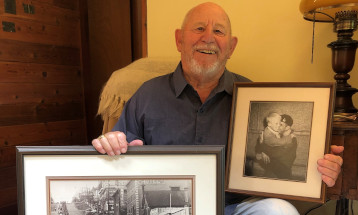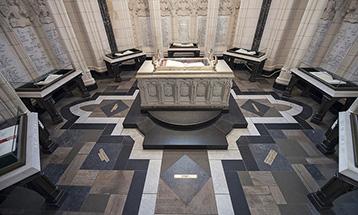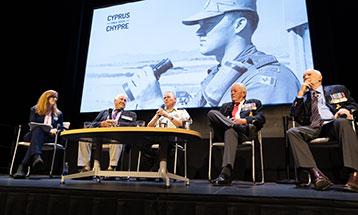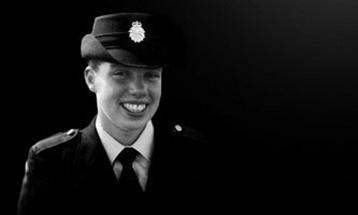A photograph captured more than 80 years ago on a British Columbian street, has given Warren (Whitey) Bernard a lifetime of notoriety.
Recently, after a church service in Tofino, B.C. two women asked for Whitey Bernard’s picture and autograph when they learned the 88-year-old was once the little blonde boy reaching for his father’s hand in the iconic “Wait for Me, Daddy” image.
“They chased me out of the church,” Bernard said with a laugh. “They wanted to know the same thing almost everyone asks about the picture: if my Dad came home.”
The famous image, which hung in every British Columbia school during the Second World War years and has graced everything from stamps to coins to Life magazine, was taken in New Westminister, B.C. by the Vancouver Daily Province photographer Claude Detloff on 1 October 1940.

Warren (Whitey) Bernard, famous as the little boy reaching for his father’s hand in 1940, with the photos of his father leaving for war and returning.
That day, more than 800 members of the British Columbia Regiment’s Duke of Connaught’s Own Rifles lined along Eighth Street, heading off to war.
Bernard wriggled from his mother, Bernice Bernard’s grasp to run and reach for his father, Sergeant Jack Bernard’s hand. His dad switched his rifle to his left hand so he could reach his right hand to his son as the soldiers behind him smiled.
Detloff captured the moment that has touched generations and so poignantly represented the pain of separation so many military families endure.
“There was nothing staged about the thing, it was an absolute moment in time,” Bernard said.
Years later when Bernard met the photographer, he told him he was setting up his shot to show the length of the line snaking over the hill when he saw the little blond boy getting out of his mother’s grasp.
It was the only image he took that was printed that day.
Bernard remembers the pain of his father leaving and the attention he received after as his image appeared in newspapers across the country. From age eight to ten, he became the poster boy for Victory Bonds, leaving school to encourage Canadians to “buy a bond today and bring my Daddy home.”
In the winter of 1945, after five years of war and battles in places like Caen and Falaise, Holland and Germany, Sergeant Bernard came home, “battle fatigue” scrawled on his medical release records. Detloff was there to photograph his return.
“He wasn’t quite the same guy who went away,” Bernard remembered.
After the war, Sergeant Bernard graded lumber before becoming a finish carpenter in his later years. Bernard said the two men had a rich and fulfilling father-son relationship until Bernard Sr. died in 1981 at the age of 74.
“We had a really good relationship. He went out of his way to make up for the lost years,” Bernard said, remembering his dad teaching him to fish trout, build cabinetry and stretch a dollar.
“He was a depression era guy, there was nothing he couldn’t do.”
The photo has become such a part of our national history that the City of New Westminster commissioned a bronze statue honouring the moment. The city unveiled the statue, by husband and wife sculptors Edwin and Veronica Dam de Nogales, on 4 October 2014 at the bottom of 8th Street, in Hyack Square, right where it was taken.
Bernard was there for the unveiling.
“When they went to war in those days you were out of it, your family was really on its own. We had to wait for letters in the mail. It was a very serious separation,” he said, adding he’s saved all his father’s letters.
“I was a little boy but I knew what was going on. I remember my mother being upset. It was a really emotional time. But I was also really proud of him because he was a soldier.”



